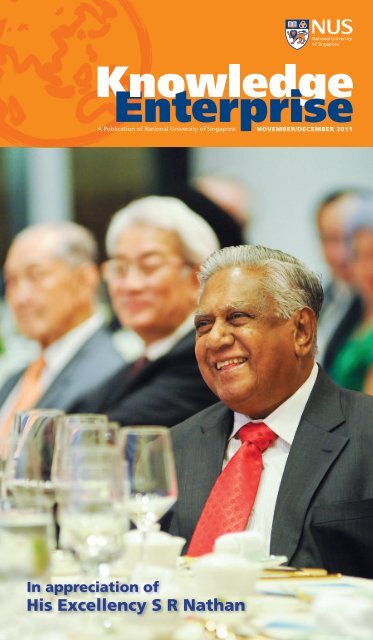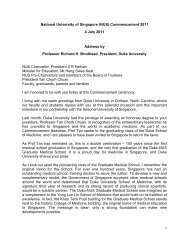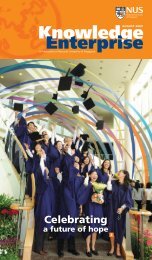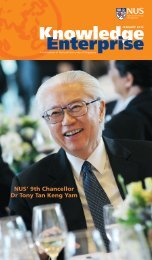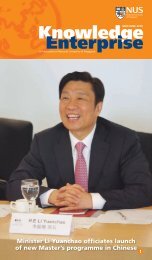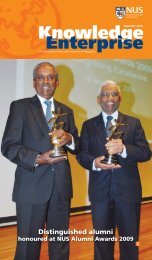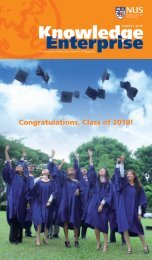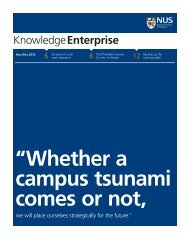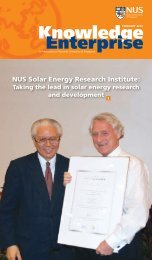Download PDF - NewsHub - National University of Singapore
Download PDF - NewsHub - National University of Singapore
Download PDF - NewsHub - National University of Singapore
Create successful ePaper yourself
Turn your PDF publications into a flip-book with our unique Google optimized e-Paper software.
A Publication <strong>of</strong> <strong>National</strong> <strong>University</strong> <strong>of</strong> <strong>Singapore</strong> NOVEMBER/DECEMBER 2011<br />
In appreciation <strong>of</strong><br />
His Excellency S R Nathan
J Y Pillay helms <strong>University</strong> Town’s third<br />
residential college<br />
NUS has appointed renowned policy maker<br />
J Y Pillay, Chairman <strong>of</strong> the Council <strong>of</strong> Presidential<br />
Advisers and Adjunct Pr<strong>of</strong>essor at the Lee Kuan<br />
Yew School <strong>of</strong> Public Policy, as the Rector <strong>of</strong> its<br />
third residential college at <strong>University</strong> Town. The<br />
College also has a newly appointed Master,<br />
Assoc Pr<strong>of</strong> Adeline Seow from NUS’ Saw Swee<br />
Hock School <strong>of</strong> Public Health. Both appointments,<br />
effective 1 July 2011, are for a three-year term.<br />
As a non-residential, non-executive head <strong>of</strong> the<br />
College, the Rector together with the Master,<br />
will chart the strategic direction and help shape<br />
the academic tone <strong>of</strong> the residential college. The<br />
Rector will also facilitate programmes and host<br />
distinguished visitors for the College, and work<br />
with the Master to build a sense <strong>of</strong> community<br />
and belonging among residents and Fellows.<br />
Pr<strong>of</strong> Pillay said that his vision for the College is<br />
to provide a supportive and enriching learning<br />
environment for the students, one that will not<br />
only allow them to stretch intellectually, but<br />
also acquire relevant skills that will give them a<br />
competitive advantage in the working world.<br />
On Pr<strong>of</strong> Pillay’s appointment, NUS Deputy<br />
President (Academic Affairs) and Provost Pr<strong>of</strong><br />
Tan Eng Chye said: “With his illustrious career<br />
in both the civil service and corporate world,<br />
our students would greatly benefit from his rich<br />
industry experience and acquire practical life<br />
skills that will serve them well when they enter<br />
the workforce.”<br />
Rector Pr<strong>of</strong> Pillay and Master Assoc Pr<strong>of</strong> Seow <strong>of</strong> UTown’s<br />
third residential college<br />
Opening in August 2012, this third College seeks<br />
to promote active citizenship and community<br />
engagement through a well-designed curriculum.<br />
Simon Chesterman to be the next<br />
Dean <strong>of</strong> Law<br />
The NUS Law School has found its next Dean following an extensive<br />
international search by a Committee led by the <strong>University</strong>’s Provost.<br />
Pr<strong>of</strong> Simon Chesterman, the School’s Vice Dean <strong>of</strong> Graduate Studies,<br />
will take over from Pr<strong>of</strong> Tan Cheng Han as NUS Law’s 14th Dean from<br />
January 2012.<br />
Said NUS President Pr<strong>of</strong> Tan Chorh Chuan <strong>of</strong> the new Dean-designate:<br />
“In Pr<strong>of</strong> Simon Chesterman, an outstanding international scholar<br />
and passionate educator, we have a new Dean with the vision<br />
and leadership to bring NUS Law to even greater heights <strong>of</strong><br />
excellence.”<br />
Pr<strong>of</strong> Chesterman<br />
will be NUS Dean<br />
<strong>of</strong> Law from<br />
January 2012<br />
KNOWLEDGE ENTERPRISE<br />
2<br />
Pr<strong>of</strong> Chesterman has extensive international experience and<br />
is widely regarded as one <strong>of</strong> the world’s leading experts on<br />
the United Nations (UN), particularly its Security Council.<br />
He has been called upon to assist in evaluating UN<br />
agencies and the international policies <strong>of</strong> governments in<br />
Europe and North America. He has also taught at various<br />
renowned universities, including the <strong>University</strong> <strong>of</strong> Oxford<br />
and Columbia <strong>University</strong>.<br />
Pr<strong>of</strong> Chesterman will succeed Pr<strong>of</strong> Tan Cheng Han<br />
who has held the position since May 2001 and is the<br />
longest-serving Dean in the School’s history. Expressing<br />
the <strong>University</strong>’s deep appreciation to the outgoing<br />
Law Dean for his transformative leadership <strong>of</strong> the<br />
School, Pr<strong>of</strong> Tan said: “He has raised NUS Law to<br />
new heights with a global and Asian outlook,<br />
and established groundbreaking partnerships<br />
with leading overseas partners such as New York<br />
<strong>University</strong>.”
In appreciation <strong>of</strong> NUS’ 8th Chancellor<br />
S R Nathan<br />
Students, staff, senior administrators and<br />
alumni gathered for an appreciation dinner<br />
hosted by NUS on 28 October 2011 in honour <strong>of</strong><br />
His Excellency Mr S R Nathan, <strong>Singapore</strong>’s 6th<br />
President and former NUS Chancellor.<br />
Reminiscing about his varsity days at the<br />
<strong>University</strong> <strong>of</strong> Malaya which later became NUS,<br />
Mr Nathan shared that university education had<br />
taught him many lessons. “The university gave me<br />
an entrée to knowledge. Over time the experience<br />
taught me how to use this knowledge and apply<br />
myself to the many tasks that were given to me,<br />
all without a brief.… The university enabled me to<br />
face circumstances in each <strong>of</strong> my careers because I<br />
was fortified by the knowledge I had acquired in<br />
the university,” Mr Nathan told the guests.<br />
He added: “Mr Nathan really cares about people. At<br />
NUS, we feel very privileged that as our Chancellor,<br />
Mr Nathan also cared deeply about our community<br />
and our institution. He was truly generous with<br />
his time, wise counsel and energy. Through his<br />
many initiatives and actions, he touched the lives<br />
<strong>of</strong> countless students, faculty, staff and alumni and<br />
was a source <strong>of</strong> inspiration for many. For this, we<br />
are indeed very grateful.”<br />
In a jovial mood at the dinner, Mr Nathan not<br />
only gave an impromptu speech on the important<br />
role <strong>of</strong> the university in his life, he also responded<br />
candidly to questions posed by the audience during<br />
a dialogue session moderated by NUS Vice Provost<br />
(Student Life) Pr<strong>of</strong> Tan Tai Yong. He was asked<br />
questions such as what were his most memorable<br />
moments as NUS Chancellor, whether he felt that<br />
students today were less engaged with what<br />
was happening in society than students <strong>of</strong> his<br />
generation, if he ever thought as a student that he<br />
would be the President <strong>of</strong> <strong>Singapore</strong> one day and<br />
other aspirations he had harboured, as well as the<br />
kind <strong>of</strong> President <strong>Singapore</strong> needs.<br />
Representing the students, Honorary General<br />
Secretary <strong>of</strong> NUS Students’ Union Mr Lee Wei Liang<br />
also spoke at the event, thanking Mr Nathan for<br />
his unstinting efforts in engaging students <strong>of</strong> the<br />
<strong>University</strong>, such as taking time to grace activities<br />
and helping to raise funds for student bursaries.<br />
Mr Nathan catching up with his former teacher Mrs Ann Wee,<br />
a former faculty <strong>of</strong> the NUS Department <strong>of</strong> Social Work<br />
NUS President Pr<strong>of</strong> Tan Chorh Chuan, who first<br />
met Mr Nathan at an Academy <strong>of</strong> Medicine event<br />
in 2003, said that Mr Nathan’s most notable and<br />
appreciated quality is his genuine warmth and<br />
ability to put others at ease, which spring from<br />
his sincere interest in people and deep sense <strong>of</strong><br />
humanism.<br />
A tribute video, where various representatives from<br />
the NUS community expressed their well wishes and<br />
appreciation for Mr Nathan’s many contributions,<br />
was also screened at the close <strong>of</strong> the dinner.<br />
Mr Nathan was <strong>Singapore</strong>’s President from 1999<br />
to 2011. As State President, Mr Nathan was<br />
concurrently the Chancellor <strong>of</strong> NUS, a position<br />
he relinquished in September 2011. NUS’ new<br />
Chancellor is Dr Tony Tan Keng Yam, the 7th<br />
President <strong>of</strong> <strong>Singapore</strong>.<br />
NOVEMBER/DECEMBER 2011<br />
(From left) Pr<strong>of</strong> Tan Chorh Chuan, NUS Chairman Mr Wong Ngit Liong, <strong>Singapore</strong> Education Minister Heng Swee Keat<br />
and Pr<strong>of</strong> Tan Tai Yong raising a glass to Mr Nathan (centre)<br />
3
NIHA Forum discusses issues in fighting<br />
chronic disease in Asia<br />
To focus on non-communicable diseases<br />
(NCDs) for the second NUS Initiative to<br />
Improve Health in Asia (NIHA) Forum was<br />
an apt and timely choice, considering<br />
the severe challenge posed by NCDs to<br />
societies, said <strong>Singapore</strong> Minister for Health<br />
Mr Gan Kim Yong at the NIHA Forum<br />
themed “Combating Chronic Disease in<br />
Asia – Gaps and Innovations”, organised by<br />
NUS on 1 November 2011.<br />
KNOWLEDGE ENTERPRISE<br />
4<br />
Advocating a preventive approach and<br />
multi-sectoral collaboration in the fight<br />
against NCDs, Mr Gan also emphasised the<br />
need for governments to work closely with<br />
prominent academic institutions that can<br />
provide reliable data and a strong evidence<br />
base for policy and action. He noted that<br />
NIHA reflects the direction that health<br />
policies are heading in the future by integrating<br />
leadership and research to aid in the formulation<br />
<strong>of</strong> sound health policies.<br />
The two-day forum was attended by some 80 highlevel<br />
participants, including directors <strong>of</strong> health in<br />
the region and healthcare policy academics and<br />
experts. President <strong>of</strong> the Institute <strong>of</strong> Medicine in<br />
the United States Pr<strong>of</strong> Harvey Fineberg gave the<br />
keynote lecture where he outlined six criteria for<br />
(From left) Vice President (<strong>University</strong> and Global Relations) Pr<strong>of</strong> Lily Kong,<br />
Pr<strong>of</strong> Han, Dr Agarwal and Mrs Tan during one <strong>of</strong> the dialogue sessions<br />
(From left) Pr<strong>of</strong> Fineberg engaging the audience in a session<br />
chaired by NUS-GAI Director Pr<strong>of</strong> Seetharam Kallidaikurichi E<br />
intervention choices and 10 strategies to address<br />
chronic disease in Asia.<br />
NIHA is coordinated by the NUS Global Asia<br />
Institute, in collaboration with the Lee Kuan Yew<br />
School <strong>of</strong> Public Policy, Yong Loo Lin School <strong>of</strong><br />
Medicine and NUS Business School. Supported by<br />
the GSK-EDB Trust Fund, NIHA is an integrative<br />
initiative set up in July 2010 to improve public<br />
health and healthcare delivery in Asia.<br />
Education leaders share insights at Second<br />
China-India-<strong>Singapore</strong> Dialogue<br />
The Second China-India-<strong>Singapore</strong> Dialogue on<br />
Higher Education was held on 21 October 2011 at<br />
the NUS <strong>University</strong> Hall. The event was organised<br />
by NUS’ Office <strong>of</strong> the Vice President (<strong>University</strong> and<br />
Global Relations), East Asian Institute and Institute<br />
<strong>of</strong> South Asian Studies, in collaboration with the<br />
Asia Research Institute and International Relations<br />
Office.<br />
Focusing on the topic “Models <strong>of</strong> Public and<br />
Private Higher Education”, this year’s Dialogue<br />
featured six distinguished education leaders from<br />
China, India and <strong>Singapore</strong>. They were Pr<strong>of</strong> Han<br />
Min, Deputy Director-General, <strong>National</strong> Centre for<br />
Education Development Research, China Ministry<br />
<strong>of</strong> Education; Pr<strong>of</strong> Zhu Qingshi, President, South<br />
<strong>University</strong> <strong>of</strong> Science & Technology, China;<br />
Dr Pawan Agarwal, Adviser (Education), Planning<br />
Commission, India; Pr<strong>of</strong> Pankaj Chandra, Director,<br />
Indian Institute <strong>of</strong> Management in Bangalore; Mrs<br />
Tan Ching Yee, Permanent Secretary, <strong>Singapore</strong><br />
Ministry <strong>of</strong> Education; and Pr<strong>of</strong> Tan Chorh Chuan,<br />
NUS President.<br />
The speakers shared insights on higher education<br />
reform, opportunities and challenges; and the<br />
governance <strong>of</strong> public and non-governmental<br />
institutions in their respective countries. Pr<strong>of</strong> Tan<br />
spoke on the corporatisation <strong>of</strong> NUS and its impact<br />
and challenges. Commenting on the governance<br />
<strong>of</strong> universities, he identified the central challenge<br />
as that <strong>of</strong> balancing between the need for more<br />
autonomy so as to respond appropriately and<br />
competitively to changes in the higher education<br />
landscape and the importance<br />
<strong>of</strong> strong alignment <strong>of</strong> the<br />
activities <strong>of</strong> publicly funded<br />
organisations to national goals<br />
and imperatives.<br />
Other than academic autonomy,<br />
other issues on how to promote<br />
multidisciplinarity, bring<br />
poorly performing institutions<br />
up to acceptable standards,<br />
and compare and benchmark<br />
institutions, were also discussed<br />
during the question and answer<br />
sessions.
First <strong>Singapore</strong> Chair <strong>of</strong> WTO programme<br />
established at NUS<br />
The World Trade Organisation (WTO), together<br />
with the NUS Law School and Centre for<br />
International Law (CIL), launched the WTO Chairs<br />
Programme (WCP) in <strong>Singapore</strong> on 4 October 2011.<br />
The Programme supports and promotes traderelated<br />
academic activities by universities and<br />
research institutions in various countries.<br />
NUS emerged as the latest Chair <strong>of</strong> the Programme<br />
among 15 others after a competitive round <strong>of</strong><br />
proposals. Assoc Pr<strong>of</strong> Michael Ewing-Chow from<br />
the <strong>University</strong>’s Law School, who is also Head<br />
<strong>of</strong> Trade/Investment Law & Policy at CIL, was<br />
appointed the first WTO Chair for <strong>Singapore</strong>.<br />
Said CIL’s Chairman and Ambassador-at-Large at<br />
<strong>Singapore</strong>’s Ministry <strong>of</strong> Foreign Affairs Pr<strong>of</strong> Tommy<br />
Koh: “The launch <strong>of</strong> the <strong>Singapore</strong> Chair marks<br />
another milestone in <strong>Singapore</strong>’s partnership with<br />
the WTO.” He added that the establishment <strong>of</strong><br />
the WTO Chair at NUS plugged its Law School into<br />
a strong network <strong>of</strong> 15 distinguished universities<br />
around the world who put their thought leadership<br />
towards supporting the WTO and its activities, and<br />
enabled CIL to gain access to the growing discourse<br />
<strong>of</strong> international trade law and the norm-setting<br />
functions <strong>of</strong> the WTO.<br />
Inaugural WTO Policy<br />
Dialogue for senior<br />
government <strong>of</strong>ficials<br />
from Asian economies<br />
Some 50 senior trade <strong>of</strong>ficials and experts<br />
from 24 countries convened in <strong>Singapore</strong> for<br />
the inaugural WTO Policy Dialogue jointly<br />
organised by WTO, the NUS Law School and CIL<br />
from 5 to 7 October 2011.<br />
Director <strong>of</strong> WTO’s Economic Research and Statistics<br />
Division Dr Patrick Low (left) with Assoc Pr<strong>of</strong> Ewing-Chow<br />
Guest-<strong>of</strong>-Honour Mr Lee Yi Shyan, <strong>Singapore</strong><br />
Minister <strong>of</strong> State for Trade and Industry,<br />
said: “The Policy Dialogue is relevant and<br />
timely in its agenda, allowing for substantive<br />
discussions about the continued importance <strong>of</strong><br />
a multilateral trade agenda, the relevance <strong>of</strong><br />
the Doha Development Agenda goals, and the<br />
future challenges which we will face together.”<br />
Partnering one <strong>of</strong> the world’s leading<br />
institutions in public health<br />
The NUS Saw Swee Hock School <strong>of</strong> Public Health<br />
(SSHSPH) and the London School <strong>of</strong> Hygiene<br />
and Tropical Medicine (LSHTM) entered into a<br />
partnership which will strengthen research and<br />
education in infectious disease control, health<br />
systems and chronic diseases with an Asian focus.<br />
Vice-Director <strong>of</strong> LSHTM Pr<strong>of</strong> Anne Mills and SSHSPH<br />
Dean Pr<strong>of</strong> Chia Kee Seng signed an agreement on<br />
31 October 2011, formalising this collaboration.<br />
(From left) Dr Khor, Pr<strong>of</strong> Chia, Pr<strong>of</strong> Mills and Dr Cable at the<br />
MOU signing ceremony<br />
The signing was witnessed by the United<br />
Kingdom Secretary <strong>of</strong> State for Business,<br />
Innovation and Skills Dr Vince Cable, <strong>Singapore</strong><br />
Minister <strong>of</strong> State for Health Dr Amy Khor, and<br />
Chief Executive <strong>of</strong> the <strong>National</strong> <strong>University</strong> Health<br />
System Assoc Pr<strong>of</strong> Benjamin Ong.<br />
Sharing the two institutions’ collaborative plans<br />
in the next few years, Pr<strong>of</strong> Chia said that they<br />
will embark on two key projects, namely, the<br />
Population Health Metrics and Analytics (PHMA)<br />
project and the Master <strong>of</strong> Public Health (MPH)<br />
course.<br />
He explained: “The first collaboration, the PHMA,<br />
leverages cutting-edge technology to bring<br />
together researchers and practitioners from both<br />
schools and multiple disciplines to integrate the<br />
disparate areas <strong>of</strong> public health research and<br />
make it relevant and accessible to practitioners<br />
like policy makers by generating usable realworld<br />
projections. In our MPH collaboration,<br />
we will draw upon each other’s experience and<br />
expertise in developing our graduates to work<br />
towards improving the health <strong>of</strong> populations.”<br />
NOVEMBER/DECEMBER 2011<br />
5
State <strong>of</strong> the <strong>University</strong> Address 2011: “Sky-poin<br />
NUS needs to focus, differentiate and synergise to meet new<br />
challenges in the changing global higher education landscape,<br />
said NUS President Pr<strong>of</strong> Tan Chorh Chuan at his annual State <strong>of</strong><br />
the <strong>University</strong> Address held on 14 October 2011 at the <strong>University</strong><br />
Cultural Centre.<br />
Addressing some 330 guests, including NUS Pro-Chancellors,<br />
Board <strong>of</strong> Trustees, senior management, staff and students, Pr<strong>of</strong><br />
Tan used the analogy <strong>of</strong> marine iguanas to stress the importance<br />
<strong>of</strong> reading changes and making timely and appropriate responses.<br />
Spotted along the beaches <strong>of</strong> the Galapagos Islands, marine<br />
iguanas have the habit <strong>of</strong> “sky-pointing”, that is, shifting their<br />
positions whenever they feel too hot. In 1995, when a volcano<br />
erupted on one <strong>of</strong> the islands, the sea iguanas, not knowing<br />
what had caused the heat, pointed to the sky as usual. Many<br />
perished as a result. The story highlighted the risks <strong>of</strong> continuing<br />
to do what one was used to doing, even though changing<br />
circumstances demanded different types <strong>of</strong> action, said Pr<strong>of</strong> Tan.<br />
Pr<strong>of</strong> Tan in conversation with guests<br />
In the context <strong>of</strong> NUS, it is critical to understand the changing<br />
global higher education landscape and position ourselves<br />
strategically. Pr<strong>of</strong> Tan shared three key trends observed: the<br />
globalisation <strong>of</strong> universities around the world, the dramatic<br />
birth and growth <strong>of</strong> new peaks in higher education in Asia, and<br />
the intensifying competition for top talent among the world’s<br />
universities. To face these challenges, Pr<strong>of</strong> Tan proposed three<br />
strategies: focus, differentiate and synergise.<br />
On “focus”, Pr<strong>of</strong> Tan highlighted that in the area <strong>of</strong> research,<br />
the <strong>University</strong> had to sharpen its focus to gain maximum<br />
leverage from its finite resources, existing strengths and<br />
comparative advantages. And he cited the example <strong>of</strong> NUS’ core<br />
focus areas in health research and some <strong>of</strong> its strategic initiatives<br />
and partnerships.<br />
KNOWLEDGE ENTERPRISE<br />
6<br />
In pursuit <strong>of</strong> differentiation that created distinctive new value,<br />
Pr<strong>of</strong> Tan shared that in infrastructure, NUS had undergone much<br />
physical transformation, to provide a richer campus experience<br />
and enhanced learning opportunities. In terms <strong>of</strong> academic<br />
programmes, Pr<strong>of</strong> Tan said that over the past years, NUS had<br />
differentiated itself in <strong>of</strong>fering different academic pathways and<br />
would continue to build on these programmes.<br />
On synergy, Pr<strong>of</strong> Tan emphasised the importance <strong>of</strong> maximising<br />
synergy between key programmes within the <strong>University</strong> as well<br />
as between NUS and its global partners.<br />
He concluded with confidence that NUS would continue to do<br />
well. He said: “Through our individual and collective efforts, we<br />
have the will and the ability to succeed, to position our university<br />
strategically in the changing higher education landscape, by<br />
making NUS a leading global university centred in Asia.”<br />
Pr<strong>of</strong> Tan recounting his recent visit to Bhutan, whe<br />
worked on his speech for the event
ting” and changes in global higher education<br />
re he had<br />
Initiatives that exemplify the three strategies<br />
Focus<br />
“Our main goal is to be better and faster at<br />
bringing basic research discoveries to clinical<br />
application; that is from ‘bench-to-bedside’,<br />
and then from ‘bedside-to-community’,” said<br />
Pr<strong>of</strong> Tan. He cited the formation <strong>of</strong> the <strong>National</strong><br />
<strong>University</strong> Health System in 2008 which had<br />
strongly facilitated “bench-to-bedside” research.<br />
To go beyond this to enhance the health <strong>of</strong> the<br />
community, the recent establishment <strong>of</strong> the<br />
NUS Saw Swee Hock School <strong>of</strong> Public Health will<br />
help pave the way. The School will strengthen<br />
NUS’ ability to analyse key trends in population<br />
health, pilot and evaluate healthcare delivery<br />
models and help prevent and respond to new<br />
infectious disease epidemics.<br />
Differentiate<br />
Besides the newly opened <strong>University</strong><br />
Town (UTown) which <strong>of</strong>fers a new model<br />
<strong>of</strong> residential college learning, Pr<strong>of</strong> Tan<br />
shared that the plan forward is to develop a<br />
complementary Campus Core. “Part <strong>of</strong> this new<br />
core will be formed by the <strong>University</strong> Cultural<br />
Centre, Conservatory <strong>of</strong> Music and the Lee<br />
Kong Chian Natural History Museum that will<br />
be built next to them. This cluster will create<br />
unique opportunities to mount joint exhibitions<br />
and programmes which explore the art, dance,<br />
music, culture and natural history <strong>of</strong> a period or<br />
theme,” he said.<br />
In the academic aspect, he said that the<br />
Office <strong>of</strong> the Provost will also formulate new<br />
programmes and approaches to strengthen<br />
students’ abilities in three core areas – clarity<br />
<strong>of</strong> thinking and communications, cross-cultural<br />
effectiveness and cultivation <strong>of</strong> wider personal<br />
and pr<strong>of</strong>essional networks.<br />
Synergise<br />
On maximising synergy between key<br />
programmes, Pr<strong>of</strong> Tan shared how NUS<br />
Enterprise accelerated the <strong>University</strong>’s efforts<br />
at commercialisation and start-up formation<br />
through setting up an Enterprise House which<br />
serves as a powerful bridge between the<br />
NUS Overseas Colleges programme and their<br />
incubator programme. To help NUS start-ups<br />
gain access to larger markets, NUS Enterprise<br />
had also set up overseas launch pads.<br />
Pr<strong>of</strong> Tan also emphasised the importance <strong>of</strong><br />
strategic global partnerships and cited the<br />
Yale-NUS College as a notable example. He<br />
shared that work had begun on the faculty<br />
recruitment drive, curriculum development<br />
and outreach to prospective students. “The<br />
vision <strong>of</strong> creating a new model <strong>of</strong> liberal<br />
arts education for the future and for Asia,<br />
has found resonance with many prospective<br />
faculty, students and supporters,” he said.<br />
NOVEMBER/DECEMBER 2011<br />
7
Paul Volcker on the financial crisis<br />
Former Chairman <strong>of</strong> the<br />
United States Federal Reserve<br />
Dr Paul Volcker shared his<br />
perspectives on the current<br />
financial crisis at a dialogue on<br />
9 November 2011, which was<br />
organised by the NUS Lee Kuan<br />
Yew School <strong>of</strong> Public Policy<br />
(LKY School) and moderated<br />
by its Dean, Pr<strong>of</strong> Kishore<br />
Mahbubani.<br />
Dr Volcker, who was also the<br />
Chairman <strong>of</strong> the US President<br />
Barack Obama’s Economic<br />
Recovery Advisory Board,<br />
fielded questions from the<br />
audience, which included academics and private<br />
sector leaders.<br />
Commenting on the European debt crisis,<br />
Dr Volcker outlined three solutions: bank<br />
recapitalisation, the need to provide loans to<br />
European nations which are debt-ridden such as<br />
Spain and Italy, as well as absolve some banks from<br />
having to repay the debt.<br />
Photo: Sir Michael Culme-Seymour<br />
Dr Volcker taking questions during<br />
the dialogue session<br />
“They have the resources in<br />
Europe to get it done; or they<br />
go to the rest <strong>of</strong> the world for<br />
funds. The rest <strong>of</strong> the world has<br />
a big stake in this. Europe as a<br />
whole can manage it, but can it<br />
manage it? They all have their<br />
own political problems,” said Dr<br />
Volcker.<br />
He also discussed the Volcker<br />
rule which he had proposed for<br />
restricting American banks from<br />
proprietary trading, whereby<br />
deposits are used to trade on the<br />
bank’s personal accounts. The rule<br />
is expected to be implemented in<br />
July 2012 as part <strong>of</strong> the Dodd-Frank financial reform<br />
bill. Dr Volcker said that lobbying by the financial<br />
industry made the proposed regulation much more<br />
complex than it needed to be.<br />
Dr Volcker last spoke at NUS in November 2010,<br />
also on the invitation <strong>of</strong> the LKY School, where he<br />
addressed the topic <strong>of</strong> progress in financial sector<br />
reform.<br />
NUS hosts MTI Economic Dialogue 2011<br />
The annual MTI Economic Dialogue was held at<br />
NUS for the second time on 20 October 2011.<br />
Co-organised by the <strong>Singapore</strong> Ministry <strong>of</strong> Trade<br />
and Industry (MTI) and the NUS Economics Society,<br />
the dialogue saw a lively discussion on economic<br />
issues facing <strong>Singapore</strong> and inclusive growth for<br />
the nation across all segments <strong>of</strong> society.<br />
“Inclusiveness cannot be reduced to a statistic or<br />
specific measurable outcome. It is an economic<br />
strategy in which every stakeholder – the<br />
Government, workers and businesses – has a key<br />
role to play; it is a mindset we must all embrace,”<br />
said Mr S Iswaran, Minister in the Prime Minister’s<br />
Office and Second Minister for Home Affairs and<br />
Trade and Industry, on <strong>Singapore</strong>’s approach to<br />
inclusive growth at the session.<br />
Besides the topic <strong>of</strong> inclusiveness, Mr Iswaran<br />
also answered questions on developing a Gross<br />
<strong>National</strong> Happiness Index for <strong>Singapore</strong>, the<br />
establishment <strong>of</strong> a minimum wage system and how<br />
multinational corporations and small and medium<br />
enterprises could help economic growth, raised by<br />
the audience comprising students from three local<br />
universities.<br />
The dialogue closed with a prize presentation<br />
ceremony to recognise outstanding Economics<br />
students from the participating universities. Mr<br />
Desmond Zheng Zhaoqin, who majors<br />
in Economics at the NUS Faculty <strong>of</strong><br />
Arts and Social Sciences, clinched the<br />
MTI (Economist Service) Book Prize for<br />
Best Third-Year Student, while recent<br />
NUS graduate Miss Ong Eng Hui won<br />
the Best Thesis Prize.<br />
KNOWLEDGE ENTERPRISE<br />
Minister Iswaran delivering his keynote speech<br />
Miss Ong receiving the MTI (Economist Service)<br />
Best Thesis Prize from the Minister<br />
Photos: Ng Jia Qing, NUS Economics Society<br />
8
Research innovations by spin-<strong>of</strong>f<br />
companies set to impact industries<br />
Two NUS spin-<strong>of</strong>f companies, BioLynx<br />
Technologies and Nephron Dx, are developing<br />
cutting-edge technologies that boost research<br />
in malaria and diabetic chronic kidney disease<br />
respectively.<br />
Co-founded by two NUS faculty members Dr<br />
Martin Lear from the Department <strong>of</strong> Chemistry<br />
and Dr Kevin Tan from the Department<br />
<strong>of</strong> Microbiology, BioLynx is working on<br />
the development and<br />
commercialisation <strong>of</strong> its flagship<br />
product, LynxTag-CQ TM , a useful<br />
tool for malaria research.<br />
The company has executed an option to license<br />
this technology exclusively from NUS and it plans<br />
to commercialise the technology into a rapid and<br />
sensitive diagnostic kit for the early detection <strong>of</strong><br />
kidney disease, as well as to predict renal disease<br />
progression.<br />
The NUS Industry Liaison Office has filed PCT<br />
(Patent Cooperation Treaty) patent applications<br />
for both research breakthroughs.<br />
Currently the only chloroquinebased<br />
fluorescent probe in the<br />
market, LynxTag-CQ TM allows<br />
researchers to visualise<br />
intracellular drug-cell<br />
interactions in an easy and<br />
cost-effective manner. It is also<br />
useful for studying topics such<br />
as chloroquine resistance, drug<br />
uptake, mechanism <strong>of</strong> drug<br />
action, or chemo-sensitisation.<br />
In addition, Dr Tan shared that<br />
LynxTag-CQ TM can be used to<br />
study mechanisms <strong>of</strong> other<br />
diseases at a cellular level too.<br />
“For example, chloroquine is<br />
also used in treating immune<br />
diseases, cancer and some viral<br />
infections. Moving forward,<br />
we plan to go beyond just<br />
chloroquine, to have a pipeline<br />
<strong>of</strong> products, synthesising<br />
chemical tags for other high<br />
value drugs,” he said. The use <strong>of</strong> LynxTag-CQ TM has<br />
been featured twice in the prestigious journal Cell<br />
Death & Disease.<br />
In the area <strong>of</strong> diabetic chronic kidney disease, new<br />
NUS spin-<strong>of</strong>f company Nephron Dx is developing a<br />
diagnostic kit that allows earlier and more accurate<br />
detection <strong>of</strong> the disease. Its diagnostic platform<br />
works by detecting nephrin in the patient’s urine<br />
sample. Nephrin is a critical protein found on<br />
specialised cells, known as podocytes, in the kidney<br />
and is necessary for the kidney’s filtration barrier<br />
to function properly. The presence <strong>of</strong> nephrin in<br />
the urine means that the kidneys have sustained<br />
some damage, and their blood filtering process<br />
may have already been compromised.<br />
Said Dr Daniel Ng from the NUS Saw Swee Hock<br />
School <strong>of</strong> Public Health, Principal Investigator for<br />
this research and Nephron Dx Co-Founder and<br />
Scientific Director: “We believe that our platform<br />
will be particularly useful for detecting early stage<br />
kidney disease, as nephrin is intimately involved<br />
in normal kidney function. Nephron Dx plans to<br />
develop both disposable dipsticks for patients, as<br />
well as quantitative equipment for nephrologists.”<br />
Dr Lear (left) and Dr Tan developed LynxTag–CQ TM , a useful tool for malaria<br />
research<br />
Bi-axial bioreactor to<br />
make waves in tissue<br />
regeneration market<br />
NUS and <strong>Singapore</strong> Polytechnic co-developed a<br />
bi-axial bioreactor that was exclusively licensed<br />
by start-up company, QuinXell Technologies,<br />
which is marketing it under the name TisXell.<br />
Offering a controlled environment with the<br />
optimal combination <strong>of</strong> nutrients and gases for<br />
growing cells, the TisXell bioreactor is ideal for<br />
slow-growing cells.<br />
CEO <strong>of</strong> QuinXell Technologies Dr P T Lau said:<br />
“The tissue regeneration market is growing<br />
rapidly. The US bone graft and substitutes<br />
market alone is expected to grow to US$3.3<br />
billion by 2013. The TisXell bioreactor will allow<br />
QuinXell to stake a claim in this emerging<br />
market. More importantly, it will revolutionise<br />
the way that pre-clinical studies are done in the<br />
field <strong>of</strong> regenerative medicine.”<br />
NOVEMBER/DECEMBER 2011<br />
9
ACCOLADES<br />
NUS MBA and EMBA programmes ranked<br />
among the world’s best<br />
NUS Business School received double honours for<br />
its MBA and EMBA programmes which were ranked<br />
among the world’s best by The Princeton Review<br />
and Financial Times respectively.<br />
The Princeton Review’s The Best 294 Business<br />
Schools: 2012 Edition placed the School’s MBA<br />
programme among the top 10 in its ranking<br />
<strong>of</strong> non-US business schools, making it the only<br />
business school in <strong>Singapore</strong> in its list <strong>of</strong> Best<br />
Business Schools (International).<br />
The Princeton Review, an education services<br />
company, obtained information through a<br />
survey <strong>of</strong> more than 19,000 students at 294<br />
business schools and data gathered from school<br />
administrators. The firm has 11 lists <strong>of</strong> the top<br />
10 business schools covering aspects such as Best<br />
Classroom Experience and Best Career Prospects.<br />
In addition, Financial Times’ Executive MBA<br />
Rankings 2011 had ranked two <strong>of</strong> NUS<br />
Business School’s Executive Master <strong>of</strong> Business<br />
Administration (EMBA) programmes – the Asia<br />
Pacific Executive (APEX) MBA and the <strong>University</strong> <strong>of</strong><br />
California, Los Angeles (UCLA)-NUS Executive MBA<br />
– among the world’s top 20.<br />
The APEX MBA moved up eight notches from<br />
last year’s 27th position to the current 19th spot,<br />
placing it among the top five in Asia. The UCLA-<br />
NUS Executive MBA, which was included in the<br />
list for the first time, clinched the 9th spot in the<br />
world.<br />
Said Dean and Stephen Riady Distinguished<br />
Pr<strong>of</strong>essor <strong>of</strong> NUS Business School Bernard Yeung<br />
following the news release <strong>of</strong> Financial Times’<br />
rankings: “We are greatly encouraged by the<br />
rankings. They are a form <strong>of</strong> high-level, global<br />
recognition that our efforts to attract the very best<br />
students from around the world are working, and<br />
demonstrate that we are progressing well towards<br />
providing the very best education in Asia.”<br />
Top student athletes honoured at<br />
NUS Sports Awards 2011<br />
The annual NUS Sports Awards held on 28<br />
October 2011 brought student achievers in<br />
tertiary sports and competitions in Academic Year<br />
2010/2011 once again into the limelight.<br />
The President Sports Team Award, the highest<br />
accolade among the Awards’ 14 categories, went to<br />
the NUS Ladies Dragon Boat Team. The Sportsman<br />
<strong>of</strong> the Year award went to final year medical<br />
student Mok Ying Ren; and the Sportswoman <strong>of</strong> the<br />
Year was business student Jasmine Ser Xiang Wei.<br />
This year’s Sports Awards also saw NUS President<br />
Pr<strong>of</strong> Tan Chorh Chuan being presented with the<br />
teamNUS Captain title, for his strong support and<br />
encouragement to NUS athletes and exemplary<br />
leadership.<br />
Winner <strong>of</strong> the President Sports Team Award, the NUS Ladies<br />
Dragon Boat Team, with one <strong>of</strong> their coaches Mr Ng Poh<br />
Khai (far left, back row)<br />
Other award categories this year included the<br />
men and ladies Sports Teams <strong>of</strong> the Year in event,<br />
individual sports and team sports; Team Player <strong>of</strong><br />
the Year; Team Rookie <strong>of</strong> the Year and Honorary<br />
Award. Also given out at the ceremony were the<br />
inaugural Sports Scholarships and NUS Sports<br />
Grants.<br />
KNOWLEDGE ENTERPRISE<br />
10<br />
• NUS Sportswoman <strong>of</strong> the Year Jasmine Ser clinched<br />
a silver medal together with Li Yafei and Cheng<br />
Jian Huan in the 10-metre women’s air rifle team<br />
event at the Asian Airgun Championships in Kuwait<br />
in October 2011. This was the best <strong>Singapore</strong> team<br />
record in four runs <strong>of</strong> the event to date.<br />
• Among the NUS paddlers selected to represent<br />
<strong>Singapore</strong> in the Asian Canoe Marathon<br />
Championships, engineering students Tan Wee<br />
Jin and Samuel Wong finished the 30.1km, 7-lap,<br />
7-portage K2 Men Seniors race in first place, clocking<br />
2:29:51; while Lam Weng Ngai from the Faculty <strong>of</strong><br />
Science and Shawn Lim from the Faculty <strong>of</strong> Arts and<br />
Social Sciences came in second in 2:31:14.<br />
(From left) Weng Ngai, Shawn Lim, Samuel Wong and<br />
Tan Wee Jin at the Asian Canoe Marathon Championships<br />
held in conjunction with the International Canoe<br />
Federation Canoe Marathon World Championships
Six NUS scientists receive <strong>Singapore</strong>’s top<br />
honours in science and technology<br />
The President’s Science and Technology Awards<br />
(PSTA) 2011 recognised eight outstanding research<br />
scientists and engineers and three promising young<br />
scientists in <strong>Singapore</strong>, six <strong>of</strong> whom were from NUS.<br />
Duke-NUS Graduate Medical School’s Vice Dean<br />
<strong>of</strong> Clinical and Faculty Affairs Pr<strong>of</strong> Soo Khee Chee<br />
received the most prestigious President’s Science<br />
and Technology Medal (PSTM) 2011, becoming<br />
the first ever clinician-scientist to achieve this. Past<br />
winners included Nobel Laureate in Physiology or<br />
Medicine (2002) Dr Sydney Brenner, former Chief<br />
Defence Scientist Pr<strong>of</strong> Lui Pao Chuen, and NUS<br />
President Pr<strong>of</strong> Tan Chorh Chuan.<br />
<strong>Singapore</strong> President Dr Tony Tan Keng Yam<br />
conferred the awards on the eight PSTA winners<br />
at a ceremony held on 8 November 2011 organised<br />
by <strong>Singapore</strong>’s Agency for Science, Technology and<br />
Research (A*STAR).<br />
The event also saw the presentation <strong>of</strong> the Young<br />
Scientist Award (YSA) to three promising research<br />
scientists and engineers aged 35 years and below,<br />
two <strong>of</strong> whom were from NUS. The YSA was<br />
administered by the <strong>Singapore</strong> <strong>National</strong> Academy<br />
<strong>of</strong> Science, with the support <strong>of</strong> A*STAR, and was<br />
presented by <strong>Singapore</strong> Minister for Trade and<br />
Industry Mr Lim Hng Kiang.<br />
President’s Science and Technology Medal<br />
Pr<strong>of</strong> Soo Khee Chee<br />
<strong>National</strong> Cancer Centre <strong>Singapore</strong> and Duke-NUS<br />
“For his distinguished, strategic and far-sighted<br />
contributions to <strong>Singapore</strong>’s clinical services and<br />
healthcare landscape, particularly in spearheading<br />
research led improvements in clinical care, and<br />
catalysing research in the public healthcare<br />
environment.”<br />
“I am honoured to receive the award. It is<br />
a recognition <strong>of</strong> the importance <strong>of</strong> both<br />
multidisciplinary team effort in science and also the<br />
role <strong>of</strong> clinician scientists in our biomedical sciences<br />
initiatives.” – Pr<strong>of</strong> Soo<br />
President’s Science Award<br />
Pr<strong>of</strong> Ooi Beng Chin and Pr<strong>of</strong> Tan Kian Lee<br />
NUS School <strong>of</strong> Computing<br />
“For their outstanding contributions to database<br />
systems research for managing ‘big data’ in large-scale<br />
parallel and distributed systems.”<br />
“We were fortunate to have very talented PhD<br />
students involved at different stages <strong>of</strong> the research.<br />
This award is also very much a recognition <strong>of</strong> their<br />
accomplishments.” – Pr<strong>of</strong> Tan<br />
President’s Technology Award<br />
Pr<strong>of</strong> Lim Chwee Teck<br />
NUS Departments <strong>of</strong> Bioengineering and Mechanical<br />
Engineering<br />
“For the development and use <strong>of</strong> novel micro biochips<br />
in the detection and diagnosis <strong>of</strong> human diseases.”<br />
“I am especially proud <strong>of</strong> the fact that our<br />
technology is wholly developed here at NUS. It is<br />
truly a <strong>Singapore</strong>an developed technology and<br />
commercialised by a local start-up. We are starting to<br />
see it being globally tested and used.” – Pr<strong>of</strong> Lim<br />
ACCOLADES<br />
Photo: A*STAR<br />
Pr<strong>of</strong> Soo receiving the PSTM from President Dr Tony Tan<br />
Young Scientist Award<br />
Dr Uttamchandani Mahesh<br />
DSO <strong>National</strong> Laboratories and NUS Department <strong>of</strong><br />
Chemistry<br />
“For significant interdisciplinary research that bridges<br />
chemistry, biology and medicine.”<br />
Dr Yan Shuicheng<br />
NUS Department <strong>of</strong> Electrical and Computer Engineering<br />
“For his research on computer vision, multimedia and<br />
machine learning.”<br />
Barry Halliwell receives Ken Bowman<br />
Research Award<br />
NUS Deputy President (Research and Technology) Pr<strong>of</strong><br />
Barry Halliwell received the Ken Bowman Research<br />
Award at the 13th Institute <strong>of</strong> Cardiovascular Sciences<br />
(ICS) Awards held on 15 October 2011 in Winnipeg,<br />
Canada. He was recognised for his significant<br />
contributions to the understanding <strong>of</strong> the role <strong>of</strong> free<br />
radicals and antioxidants in cardiovascular disease.<br />
Said Pr<strong>of</strong> Halliwell: “I am delighted by this<br />
international recognition, but also humbled when I<br />
think <strong>of</strong> the many others who have contributed to the<br />
work, including my outstanding research collaborators<br />
at NUS. The credit really goes to the many innovative<br />
and hardworking members <strong>of</strong> my lab, current and<br />
former.” The annual award event recognises leadership<br />
and success in promoting cardiovascular research and<br />
education as well as lifetime research achievements.<br />
Pr<strong>of</strong> Halliwell (left) receiving the award from an<br />
Honourable Member <strong>of</strong> the Manitoba Legislature<br />
Mr Bidhu Jha<br />
NOVEMBER/DECEMBER 2011<br />
11
Launch <strong>of</strong> Chua Thian Poh Community<br />
Leadership Programme<br />
NUS has developed a new programme<br />
to groom <strong>Singapore</strong>’s next generation<br />
<strong>of</strong> community leaders. Announced at<br />
a launch event on 2 November 2011<br />
graced by <strong>Singapore</strong> Deputy Prime<br />
Minister Mr Teo Chee Hean, who is<br />
also the Coordinating Minister for<br />
<strong>National</strong> Security and Minister for Home<br />
Affairs, the Chua Thian Poh Community<br />
Leadership Programme will be<br />
conducted at the NUS <strong>University</strong> Town<br />
(UTown) from January 2012.<br />
Established with a generous gift <strong>of</strong><br />
S$5 million from Mr Chua Thian Poh,<br />
Chairman and Chief Executive Officer <strong>of</strong><br />
real estate development and investment<br />
company Ho Bee Investment Ltd, the<br />
programme will be supported with<br />
a total fund <strong>of</strong> S$12.25 million with<br />
the government’s matching grant. In<br />
recognition <strong>of</strong> Mr Chua’s gift, the <strong>University</strong> has<br />
named a multipurpose hall within UTown the<br />
“Chua Thian Poh Hall”.<br />
Said NUS President Pr<strong>of</strong> Tan Chorh Chuan: “NUS<br />
is deeply appreciative <strong>of</strong> Mr Chua’s support and<br />
generous gift. This new programme will encourage<br />
NUS students to be more deeply engaged with key<br />
social issues in <strong>Singapore</strong>, to have an opportunity<br />
to study them and be inspired to initiate<br />
(From left) <strong>Singapore</strong> Member <strong>of</strong> Parliament Mr Wong Kan Seng,<br />
Education Minister Heng Swee Keat, Mr Chua, DPM Teo, NUS Trustee<br />
Mdm Kay Kuok and Pr<strong>of</strong> Tan at the launch<br />
community involvement projects.” He added that<br />
UTown, which combines the vibrancy <strong>of</strong> residential<br />
living with an exciting multidisciplinary academic<br />
programme, is an ideal platform to launch this<br />
innovative programme.<br />
Mr Chua said: “I am pleased to be able to provide<br />
this gift to establish this new programme at<br />
UTown. I believe it is important to expose students<br />
to critical social and community issues so that<br />
they will be able to learn the best practices in<br />
community development.”<br />
DPM Teo meeting Mr Chua and Pr<strong>of</strong> Tan at the event<br />
Headed by Assoc Pr<strong>of</strong> Albert Teo, the two-year<br />
programme aims to groom community leaders who<br />
will not only be intellectually engaged with social<br />
and community issues, but will also be passionate<br />
about addressing social and community challenges<br />
in <strong>Singapore</strong>. Open to all NUS undergraduates, the<br />
programme will welcome its first class <strong>of</strong> about 20<br />
students in January 2012 and take in 30 students<br />
a year eventually at steady state. Students will<br />
participate in learning modules, research projects,<br />
attachments with social service organisations, talks<br />
and workshops relating to social issues and the<br />
topic <strong>of</strong> Community Leadership.<br />
KNOWLEDGE ENTERPRISE<br />
12<br />
NUS-Chua Thian Poh Community Leadership Symposium<br />
Held in conjunction with the Chua Thian<br />
Poh Community Leadership Programme’s<br />
launch was the inaugural NUS-Chua Thian<br />
Poh Community Leadership Symposium.<br />
Dr Mohamad Maliki Bin Osman, Senior<br />
Parliamentary Secretary, <strong>Singapore</strong> Ministry <strong>of</strong><br />
Defence and <strong>National</strong> Development delivered<br />
the keynote speech at the Symposium, sharing<br />
his thoughts on how community leadership<br />
could make a difference.<br />
KNOWLEDGE ENTERPRISE n NOVEMBER/DECEMBER 2011 VOLUME 11 NO. 05<br />
Editor: Fua Lee Na Contributors: Jessey Beh; Veronique Ah Sen Distribution Manager: Matthew Seah<br />
Office <strong>of</strong> Corporate Relations, <strong>National</strong> <strong>University</strong> <strong>of</strong> <strong>Singapore</strong><br />
<strong>University</strong> Hall, Lee Kong Chian Wing UHL#05-03, 21 Lower Kent Ridge Road, <strong>Singapore</strong> 119077<br />
Tel: (65) 6601 1341 Fax: (65) 6775 6386 E-mail: Knowledge_Enterprise@nus.edu.sg Website: newshub.nus.edu.sg<br />
ISSN 0219-614X Company Registration Number: 200604346E<br />
Other experts in community building and<br />
leadership featured at the event included<br />
Pr<strong>of</strong> Maureen Pagaduan, Chairperson <strong>of</strong> the<br />
Department <strong>of</strong> Community Development at<br />
the <strong>University</strong> <strong>of</strong> the Philippines, Diliman; and<br />
Mr Mark Hecker, Executive Director <strong>of</strong> Reach<br />
Incorporated in the United States. This annual<br />
symposium serves as a platform for students in<br />
the programme to showcase their research on<br />
community issues and challenges in <strong>Singapore</strong>.<br />
Cover photo: Education Minister Mr Heng Swee Keat (centre) with two new graduates.


